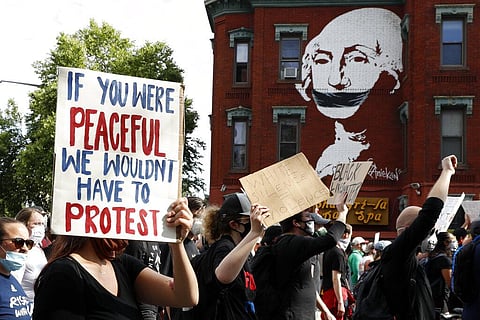

"I can’t breathe" has become a war cry across the world. In an era when an epidemic like Covid-19 was sweeping over the world, it is perhaps appropriate that the world is dealing with one of the most dangerous viruses, racism, with this war cry.
The streets of US are being taken over by angry protesters against the institutionalised racism and the ripples are being felt everywhere.
For America, this is a defining moment. The angry protesters have taken over the streets, shouting slogans against the discrimination, putting the usually tactless Donald Trump floundering for an appropriate response.
One of the most heartwarming things to see is the presence of white people standing in solidarity with their black compatriots. One feels, there is hope left for humanity even at this bleakest of times. Until one looks around and sees how we are in India, that is.
True, a few Indian celebrities also have shown solidarity by tweeting against the horrible murder of George Floyd, an African-American under the crushing knees of a racist police officer.
Many of the social media babbles are busy condemning this reprehensible act. One would have guessed we had buried our conscience long ago at the altar of pseudo-nationalism.
It is a relief to see that we have some conscience left, though it only gives us a long vision to see things happening far away.
How would one explain our collective indifference or even hostility at the plight of the hapless and voiceless of our country?
We saw how the police were brutally beating up starving migrants going home and never batted an eyelid.
Of course, most policemen were working day and night to serve the people, but that would be true about the US, too. Not all policemen were going around, choking people to death in the US, yet when such an atrocity happened, there is tremendous outpouring of anger.
The New York City police even knelt before the angry protesters as an act of apology, something unthinkable in India. We celebrate police brutality. We communalise even a collective suffering like an epidemic.
The blacks are the minority in the US. The country has a history of racism and slavery. History does not matter if the present is different in a positive way.
More white people think it is important to come out of their comfortable lives to protest on the streets, to face the water canons and tear canisters, just to make a point.
It isn’t that their government didn’t take action against the racist police officer. They did. It isn’t that their government tried to protect the erring officers, or their courts adjourned judgements indefinitely. They did not.
Yet, the people came out, standing shoulder to shoulder, on the streets, to defy bigotry, to stand for humanity.
When was the last time Indians did the same for someone beaten up, shot dead or lynched for belonging to the wrong caste, wrong religion, having wrong food choices or to the wrong gender? Teaching others a lesson is reason enough for us to justify anything.
Bigotry has gone mainstream and many so-called educated have started wearing their prejudices like a badge of honour.
The poor gets beaten up for no reason other than they were migrating from cruel and indifferent cities to the safety of their villages.
Those who have no need to go out, who are having stay-at-home vacations sharing recipes online or debating over web series they binge-watched feel happy that the strong arms of law is reaching to punish those who defy the lockdown.
For a moment imagine that a few people had come out in protest during one of the many ‘Floyd moments’ that occur in India.
What would our self-declared patriotic channels call these protesters? Anti-nationals? One shudders to think about the cacophonic ruckus that would be whipped up by demented anchors and possessed journalists against such protesters.
The poison served through countless WhatsaApp forwards would be enough for annihilating life from the planet.
Just observe how the media in the US is handling the protests to know why it would take a long time for us to become a real democratic country.
While discussing the racism in America and feeling proud about putting a social media status to condemn it, we conveniently forget we have been practicing the same in the name of caste and religion for countless years.
It is not the crime that defines a society, but the way the society reacts to the crime. If we replace compassion with pseudo-nationalism, we aren’t losing just the right to be called civilised, but also our inheritance to a great civilisation.
It means we have rejected all that made our ancient civilisation great while keeping its greatest flaws intact.